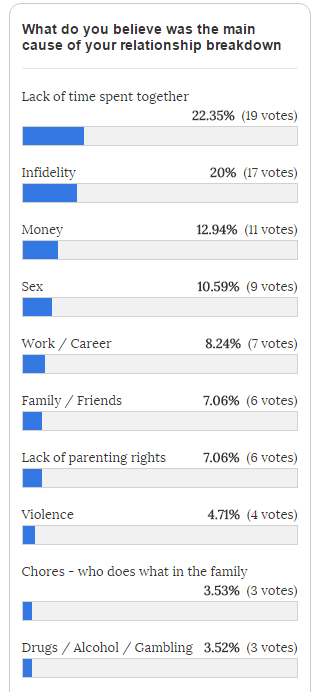 I don’t think the expense of breaking up is ever considered when we are thinking about breaking up? If we did, we might try a little harder to stay together because it can put an enormous amount of strain on the hip pocket!
I don’t think the expense of breaking up is ever considered when we are thinking about breaking up? If we did, we might try a little harder to stay together because it can put an enormous amount of strain on the hip pocket!
When we know it’s over or when we know this person we are currently calling a partner is not going to be a “life” partner, all we can think about is moving out and on and trust everything will be ok. It’s important to make sure that both people involved are ok and living arrangements and money have been considered fairly so no one is doing it unreasonably tough.
Over time things slowly return to normal (or a new normal) but the initial expense can be a real shock and i don’t think any of us expected or worked on a “break up budget” when we made our mind up to break up.
Who would have thought we need to have two of everything 🙂 Some people instigating the break up, tend to be quite generous and it would be normal to just leave with our clothes in a suitcase. If it is more of a fair divide? then half of all the living items needs to be repurchased. If you have kids, it is more beds,towels, crockery, table & chairs and clothes, toys, books and sporting equipment etc too.
Don’t forget the bond & rent of your new home becomes fully paid for by one (1) person, gas, electricity, food, insurances, foxtel etc etc all is now paid for solely by you.
There are ways to minimize the financial pain
If you know its coming and you have months to plan, start putting money aside and build an emergency fund, we all should have one anyway, even if you are completely happy and in love with you partner. You never know what can blind side you at 3pm on a Tuesday afternoon, trust me it can happen.
Once you have worked out the divide, write a gap list and and let your friends and family know what you need, your friends and family can bring you some of the essentials you will need to start again, this can help with your personal support by having supportive friends & family visiting you. Myer have a gift registry where they will list all the things you need, like, towels, bedding, glasses, kitchen appliances, cups, cutlery etc and as they get purchased, Myer will cross them off your list so no one doubles up on break up gifts.
You can also create a new bank account for the “start again fund” and send the account details to all your friends, family and Facebook contacts and ask them to contribute anything they can – the smallest amounts all add up. Don’t forget to personally thank every contributor!
I hope you never have to experience a break up, sometimes it is inevitable, this might give you some ideas to think about before you make that decision. Try hard to resolve your issues as it is much cheaper and financially better in the long term to stay together and work things out.























Recent comments